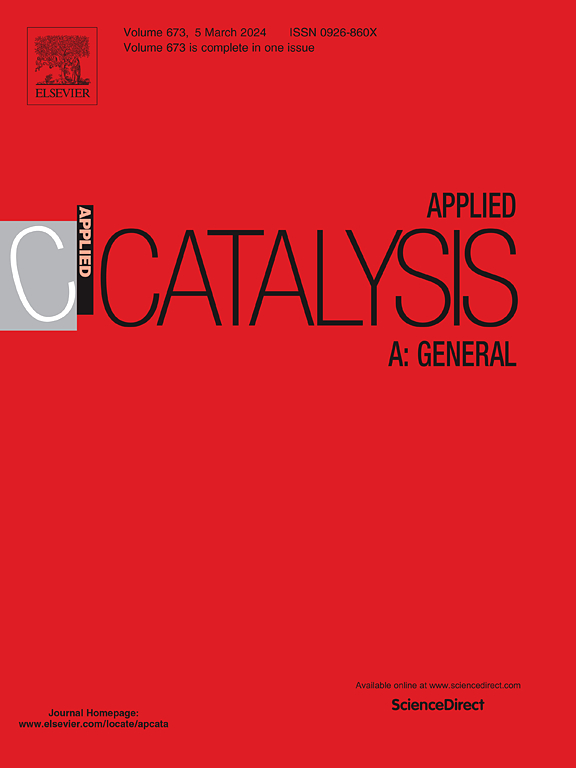镧族元素促进丙烷脱氢的PtGa催化剂:探索关键性能描述符
IF 4.8
2区 化学
Q2 CHEMISTRY, PHYSICAL
引用次数: 0
摘要
丙烯是化学工业的重要组成部分,是石油化工领域的第二大原料,是主要合成材料和丙酮、异丙醇等重要工业化学品的基础元素。传统的丙烯生产方法面临着环境挑战,促进了替代途径的研究,如丙烷直接脱氢。虽然商业化的PtSn或ptga催化剂在丙烷脱氢方面已经取得了成功,但为了降低运营成本,还需要进一步的改进。因此,本研究利用四种镧族元素(La, Ce, Pr和Nd)以不同的负载(1 wt%, 3 wt%和5 wt%)来修饰PtGa/Al2O3催化剂,从而提高转化率,选择性和稳定性。此外,本研究基于一些关键性能描述符建立了清晰的构效关系,强调了还原性、总酸浓度和总焦含量对转化率、选择性和稳定性的有效影响。还应考虑强金属-支撑相互作用对转化和稳定性的影响,强调获得催化性能的复杂性。本研究揭示的各种性能描述符的探索有助于丙烷脱氢催化剂的合理设计,解决了持续改进和定制高效丙烷脱氢催化剂的问题。该研究还为优化各种工业反应的催化性能提供了有价值的见解,进一步推动了催化领域的发展,促进了可持续和高效的化学过程。本文章由计算机程序翻译,如有差异,请以英文原文为准。
Lanthanum-group elements promoted PtGa catalysts for propane dehydrogenation: Exploring key performance descriptors
Propylene, a crucial component in the chemical industry, holds a prominent position as the second-largest material within petrochemicals, serving as a foundational element for major synthetic materials and essential industrial chemicals such as acetone and isopropanol. Conventional propylene production methods confront environmental challenges, promoting the investigation of alternative pathways, such as direct propane dehydrogenation. While commercial PtSn or PtGa-based catalysts have demonstrated success in propane dehydrogenation, further enhancements are imperative to mitigate operational costs. Therefore, this study utilizes four lanthanum-group elements (La, Ce, Pr, and Nd) with varying loadings (1 wt%, 3 wt%, and 5 wt%) to modify PtGa/Al2O3 catalyst, resulting in improved conversion, selectivity, and stability. Furthermore, this research establishes a clear structure-activity relationship based on some key performance descriptors, underscoring the effectiveness influence of reducibility, total acid concentration, and total coke content in conversion, selectivity, and stability. The impact of strong metal-support interactions on conversion and stability should also be considered, highlighting the complexities in accessing catalytic performances. The exploration of diverse performance descriptors revealed in this study contributes to the rational design of catalysts for propane dehydrogenation, addressing ongoing efforts to refine and tailor catalysts for efficient propane dehydrogenation. This study also offers valuable insights for optimizing catalytic performance across various industrial reactions, further advancing the field of catalysis and promoting sustainable and efficient chemical processes.
求助全文
通过发布文献求助,成功后即可免费获取论文全文。
去求助
来源期刊

Applied Catalysis A: General
化学-环境科学
CiteScore
9.00
自引率
5.50%
发文量
415
审稿时长
24 days
期刊介绍:
Applied Catalysis A: General publishes original papers on all aspects of catalysis of basic and practical interest to chemical scientists in both industrial and academic fields, with an emphasis onnew understanding of catalysts and catalytic reactions, new catalytic materials, new techniques, and new processes, especially those that have potential practical implications.
Papers that report results of a thorough study or optimization of systems or processes that are well understood, widely studied, or minor variations of known ones are discouraged. Authors should include statements in a separate section "Justification for Publication" of how the manuscript fits the scope of the journal in the cover letter to the editors. Submissions without such justification will be rejected without review.
 求助内容:
求助内容: 应助结果提醒方式:
应助结果提醒方式:


